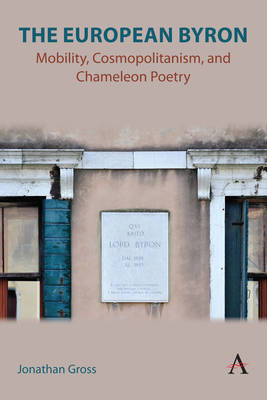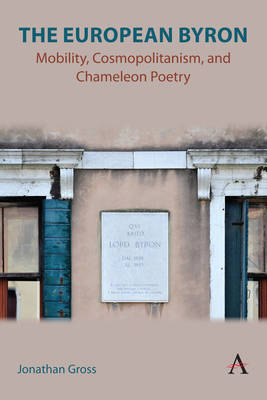
- Retrait en 2 heures
- Assortiment impressionnant
- Paiement sécurisé
- Toujours un magasin près de chez vous
- Retrait gratuit dans votre magasin Club
- 7.000.0000 titres dans notre catalogue
- Payer en toute sécurité
- Toujours un magasin près de chez vous
Description
Explores Byron's borrowings from Thomas Moore, Torquato Tasso, Percy Shelley, and so on, and transformations as they manifested themselves in his reading.
Byron concealed himself in various literary disguises, a process he called "mobility." In this study of influences on Byron's verse and Byron's European impact, I explore these borrowings and transformations as they manifested themselves in his reading. At issue is the very concept of romantic poetic voice. Framing himself in the tradition of the Irish yet cosmopolitan Thomas Moore, Byron adopted continental guises, imitating both Italian writers and political heroes, such as Dante, Machiavelli, and Tasso in such works as "The Lament of Tasso" and "Don Juan". In establishing an Italian identity, Byron relied upon the Italian writers he translated (Boiardo, Pulci, Dante), Thomas Moore's "Fudge Family in Paris," and Shelley's "Julian and Maddalo," as well as his transformation of Goethe's "Faust" in "Manfred". This Europeanization of Byron should not conceal the fact that Byron adopted poses from his predecessors, such as Walter Scott, in order to fashion himself as a Scottish poet who also happened to be English. Byron became the writers he read: Moore, Shelley, Wordsworth, Scott, Foscolo, Lady Morgan, and Madame de Staël. Those who imitated Byron, particularly Alexander Pushkin and Adam Mickiewicz, often read him in French translations, but became acute interpreters of his literary example. They explained how the European Byron was created in the nineteenth century, and what it meant to be a Harold in Muscovite Cloak, or a Polish Byron, or any national reincarnation of this complex, chameleon poet.
By borrowing from a wide eighteenth-century field, Byron showed how reading could become writing, fulfilling, for Pushkin and Mickiewicz, a mobile and chameleon definition of the epic, as a novel in verse or product of digressions and improvisations. I begin by examining Thomas Moore, whose "Fudge Family in Paris" helped shape the tone and style of Byron's Don Juan, despite its more obvious European borrowings. Byron's conversations with Madame de Staël encouraged him to "Stick to the East," and he followed her example during his years in England. By examining the manuscripts and marginalia of Byron, the author shows the key influence of Madame de Staël's Corinne, Ugo Foscolo's Last Letters of Jacopo Ortis, and Lady Morgan's Italy on Childe Harold I-II, Hebrew Melodies, and Childe Harold IV, and Don Juan.
In "The Ironic Mode in Politics,"the author considers Byron's support for the Greek Revolution, which he cast in cynical terms. His political/poetic example led Pushkin to enlist and Adam Mickiewicz as well, the latter of whom died in Istanbul. The museums that honor them present narratives of Byron's European impact, particularly his legacy in political liberalism. The book thus concludes by considering how scholarship on Alexander Pushkin's Eugene Onegin transformed the epic into a novel in verse. Adam Mickiewicz's translation of "The Giaour" and his improvisations, which impressed Pushkin, draw on Byron's digressive style. Their epics, Eugene Onegin and Pan Tadeusz, show the legacy of Byron's poetic influence and his political support for freedom of speech.
Spécifications
Parties prenantes
- Auteur(s) :
- Editeur:
Contenu
- Nombre de pages :
- 292
- Langue:
- Anglais
- Collection :
- Tome:
- n° 1
Caractéristiques
- EAN:
- 9781839991424
- Date de parution :
- 16-09-25
- Format:
- Livre relié
- Format numérique:
- Genaaid
- Dimensions :
- 152 mm x 229 mm
- Poids :
- 562 g

Seulement chez Librairie Club
Les avis
Nous publions uniquement les avis qui respectent les conditions requises. Consultez nos conditions pour les avis.





